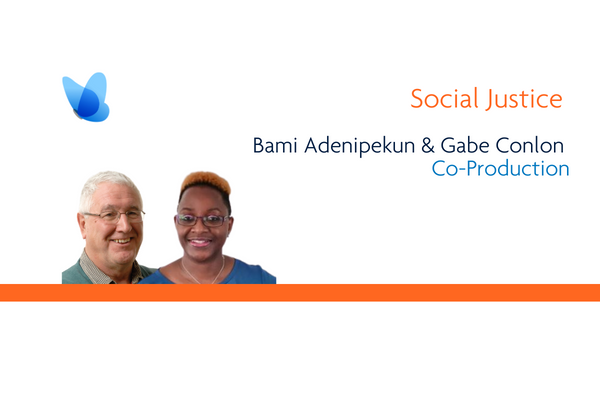– Bami Adenipekun
I believe that every single person can make a difference if we work on the premise that we want to treat people justly and fairly, and most importantly, that we listen to people, that we will not assume, especially when it comes to the lived experience of somebody else.
To mark World Day of Social Justice 2022, which took place on Sunday, Bami Adenipekun, healthcare inequity specialist, researcher, author, speaker and Practice Solutions Associate, spoke with Gabe Conlon, Chair and founder of Practice Solutions, about what social justice means in health and social care settings.
Below is an edited transcript of their conversation, which took place on Zoom on Wednesday 16 February 2022.
Gabe: If one’s actions are to support people’s sense of justice and equity, we need to start showing kindness to people. Organizations have to examine their core value system and explore how engagement and interaction is supported through this. I’ve been around a long time and I’ve read a lot of reports. What I haven’t seen is organic change in organizations.
Bami: Yes. When I started thinking about social justice, the first thing I thought about were the gaps between the ‘haves’ and the ‘have nots’.
Gabe: Absolutely.
Bami: When we start talking about justice, we are talking about fairness. Do people feel heard, feel understood? For me, fundamentally in everything I do, I believe that every single person, regardless of their station in life, wants to be heard. They want to be understood. And when they’re heard and understood, it’s clear that the things that people need vary. Because people are different. And this is the difference between equality and equity.
You have two people who are trying to reach for a fruit on a tree, and equality says, ‘give both of them the same length ladder’. And yet, when you give each of them the same length ladder, one person is still struggling to reach. So, equity comes in to say, ‘look, people are different and you might need to modify what you offer so that across board, the outcomes are equal for everyone.’ So basically, so for me, it’s all to do with fairness. It’s to do with participation. It’s to do with feeling like part of a collective rather than the other.
Gabe: I don’t know whether it’s changed or not, but certainly in the nineties, up until I retired from my work as Head of Social Care, the difference in life expectancy between North Cardiff and South Cardiff was quite significant. And the difference between Cardiff and the upper Valleys was somewhere in the order of 10 years.
So the question for me is: how do we achieve social justice in the context of healthy outcomes for people? And it feels like there is an investment challenge in that, but there’s also, as you said, a participation challenge. Participation is used as a throwaway term: what do we actually mean by it? Does participation mean that you turn up to a meeting and you’re told what’s going happen? You express your views about what’s planned to happen, and then you go away? Is participation a questionnaire that you receive in the post, which ask you about your experiences? I would say, no, it’s not, because participation is about ownership. It’s about a sense of being valued in that experience. And it’s also a recognition that the people you’re talking to are experts in their own lives. And they bring a different perspective.
My experience as an Irish child growing up in the UK in the fifties and sixties was interesting to say the least. My father’s accent set him aside from other people. At that time, education was well supported and my family encouraged me. I got into college and I had my fees paid for. The outcome of that was that I started to move from vulnerability to the privilege. I suspect that, ultimately, what we don’t actually do is understand people’s experiences. And we often don’t strive well enough to understand.
Bami: I’m glad that you talked about understanding, because when you talk about the things that, whether you’re talking about government and large organizations or whatever, a lot of the initiatives that are meant to address inequality start from the presumption of thinking, they know what is required already. When you come with the presumption that you already know what this person needs, that you are already an authority on this person’s experience, and a lot of times it can actually it’s unconscious, as a result, every initiative that comes from that will be flawed.
Sometimes, when some organizations mention engagement, the process has been done without a fundamental understanding of the lived realities of people.
There’s nothing more powerful than giving people a voice. So for example, let’s look at social care and, and look at the elderly in a lot of cultures. The reason why people suffer in silence for a very long time is the fact that [in many cultures] we’re meant to look after our elders; it is not the done thing to send our elders to strangers. But at the same time, people are being crushed by the weight of the care that they have to give. But if you don’t engage, and ask these people: ‘number one, what do you need? And why? What can we do to support you?’, then they won’t really engage. If I had a pound for every time that somebody has told me that a certain community doesn’t engage, trust me, I will be, I’d be in The Bahamas now.
Gabe: Yes. In my experience, listening and involving the workforce actually results in better production, greater value and more pleasant working conditions.
Bami: There’s more to transformation than good intentions and policies and all of that stuff. So, let’s talk about cancer care because that’s something of an area of expertise of mine, having been a patient and a loved one, and someone who coaches people with cancer as well.
The outcomes for cancer patient in Wales has always been poorer than in England. Now, there are a lot of historic reasons for that, and now of course the pandemic hit cancer services like you wouldn’t believe. I remember there was a BBC Panorama programme in July, 2020. So, a few months into the pandemic and already they were saying that there would be an estimated 11,000 to 35,000 extra cancer deaths as a result of the impact of the pandemic on health services. You can have a committee on how to make it work, a committee on how to look after that committee, a committee on how to move a broom, a committee on how to supply a committee. But the bottom line is: ask what the first thing to be done is, and get it done.
Gabe: Yes, one of the things we have is investments, but the experience of social justice is delivered through the hands of the frontline worker. Be it a nurse, doctor, social worker and so on. And the challenge for us is: how do we change the way people think about the value of the person they’re working with?
Bami: One of the things I always say is that, whether they realize it or not, the person delivering the care is in a position of power: there’s a power dynamic. You mentioned something very powerful about the dignity of the person, that every single person is deserving of dignity, no matter how broken their physical body, they’re still human. A lot of times, social workers and other decision makers go to university, they do their degree, they do their placements, and as soon as they come out, because the profession is so short staffed, they’re thrown in at the deep end, and they’re expected to learn on the job. And a lot of times the people who mentor them are too busy. It’s too hectic. So, we’re at the point where, within a couple of years of qualifying, all the ideals they have around making a difference, it almost feels as if it disappears into just trying to firefight, I, and playing catch up and catching their tails. But yes, if there isn’t a recognition of the dignity of the person, then social justice will never happen.
And those in positions of power, whether they’re the politicians, whether they’re the professional healthcare professionals or providers, they need to recognize their power, the power that they have, and handle that power with responsibility and kindness.
Gabe: If leaders of organizations don’t share power with those who work in their teams, and those who work in their teams don’t share power or transfer power to the people who use the service, we will continue to have the same kind of experiences for people. Maybe we should just look for little steps. Maybe we should just control what we have the ability to control in our lives and how we ensure that we as individuals deliver that, that experience of being justly treated, being respected.
Let’s see if we can start a movement, a movement where we work with our colleagues and in Practice Solutions, we work with our colleagues to create just situation for the people that we come into contact with. And maybe that’s all we can hope to achieve. And you know what? We may influence others. We may, because it’s a better way of working.
Bami: Yes, this is about personal responsibility. Because one of the things I fundamentally believe is that, if I cannot be part of the solution, then there’s no use me complaining. I believe that, in our different ways, every single person can make a difference. We can make a difference because every single one of us interacts with others. If we go in with the premise that we want to treat people justly, we want to treat people fairly, and most importantly, we want to listen to people, that we will not assume, especially when it comes to lived experience of somebody else.
And this is one of the big things. A lot of times the, one of the things that gets in the way of seeking the opinion of the end user is ego, pride. It is the idea that, what can an 80 year-old who does not remember her name tell you about care?
Gabe: Oh, but she can…
There are systems in place which reinforce the power and status of some individuals. And because of that, there is a distrust of participative opportunities. There is a distrust that anything you might say will have value to others. And that’s a challenge that we face: how do we convince people that what they say in participation, we will learn from, we will act. And I think that you start off with showing kindness to people and cooperating with others.
The UN wrote a paper some years ago about how organizations should work together in war torn countries. Now, you would think that these organizations would find it very easy to work together because they’re going in for a relief operation. But no, it was a competitive activity. And sometimes those conflicts of priorities and around roles get in the way of working together to support the delivery of a whole system of social justice. And, and it, the question for me and for the leaders in those organizations is: how do you actually work together to ensure that you understand each other’s challenges? And I actually think that sometimes the way in which I’ve handled issues over the years could have been done differently.
Bami: A lot of times, the people who are making these rules and who are making policies, who are in charge of dissemination of power, a lot of times they’re white, middle aged men. And of course, a lot of things that they do are shaped by their worldview of privilege to the point where a lot of times they, they cannot really connect with those who they perceive as beneath them.
Gabe: Yes.
Bami: And that means that you have a group of people in leadership who should be shaken up; there should be more diverse leadership because, when you not talk about social justice we cannot ignore representation In leadership, in the diversity of representation of different marginalized groups in society. Do they feel that there’s somebody that can advocate for them in the leadership team?
Gabe: So it’s how do you appeal to an individual’s sense of creativity, the sense of having a co-production activity, a sense of ownership?
Bami: Respect
Gabe: Respect, absolutely. Respect for the contribution of everyone, that every single person has something to contribute.
Bami: Absolutely.
Below you can watch some short clips from Bami and Gabe’s recorded Zoom conversation, facilitated by Harriet, Practice Solutions’ Communications Lead:





